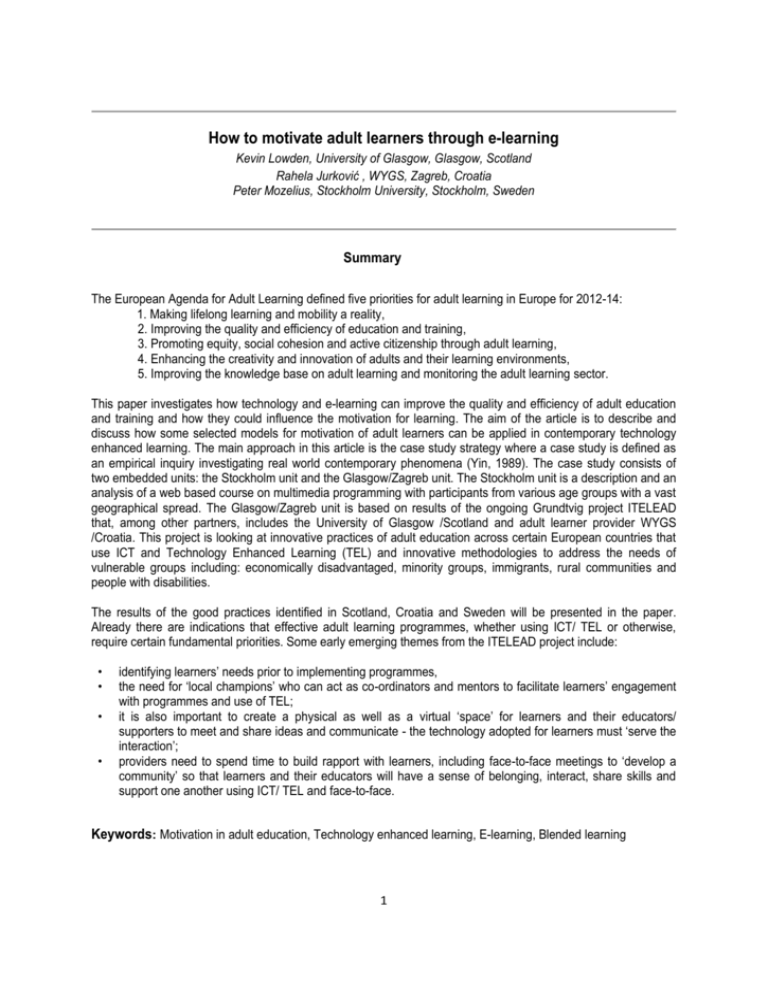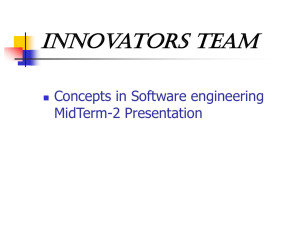How to motivate adult learners through e-learning
advertisement

How to motivate adult learners through e-learning Kevin Lowden, University of Glasgow, Glasgow, Scotland Rahela Jurković , WYGS, Zagreb, Croatia Peter Mozelius, Stockholm University, Stockholm, Sweden Summary The European Agenda for Adult Learning defined five priorities for adult learning in Europe for 2012-14: 1. Making lifelong learning and mobility a reality, 2. Improving the quality and efficiency of education and training, 3. Promoting equity, social cohesion and active citizenship through adult learning, 4. Enhancing the creativity and innovation of adults and their learning environments, 5. Improving the knowledge base on adult learning and monitoring the adult learning sector. This paper investigates how technology and e-learning can improve the quality and efficiency of adult education and training and how they could influence the motivation for learning. The aim of the article is to describe and discuss how some selected models for motivation of adult learners can be applied in contemporary technology enhanced learning. The main approach in this article is the case study strategy where a case study is defined as an empirical inquiry investigating real world contemporary phenomena (Yin, 1989). The case study consists of two embedded units: the Stockholm unit and the Glasgow/Zagreb unit. The Stockholm unit is a description and an analysis of a web based course on multimedia programming with participants from various age groups with a vast geographical spread. The Glasgow/Zagreb unit is based on results of the ongoing Grundtvig project ITELEAD that, among other partners, includes the University of Glasgow /Scotland and adult learner provider WYGS /Croatia. This project is looking at innovative practices of adult education across certain European countries that use ICT and Technology Enhanced Learning (TEL) and innovative methodologies to address the needs of vulnerable groups including: economically disadvantaged, minority groups, immigrants, rural communities and people with disabilities. The results of the good practices identified in Scotland, Croatia and Sweden will be presented in the paper. Already there are indications that effective adult learning programmes, whether using ICT/ TEL or otherwise, require certain fundamental priorities. Some early emerging themes from the ITELEAD project include: • • • • identifying learners’ needs prior to implementing programmes, the need for ‘local champions’ who can act as co-ordinators and mentors to facilitate learners’ engagement with programmes and use of TEL; it is also important to create a physical as well as a virtual ‘space’ for learners and their educators/ supporters to meet and share ideas and communicate - the technology adopted for learners must ‘serve the interaction’; providers need to spend time to build rapport with learners, including face-to-face meetings to ‘develop a community’ so that learners and their educators will have a sense of belonging, interact, share skills and support one another using ICT/ TEL and face-to-face. Keywords: Motivation in adult education, Technology enhanced learning, E-learning, Blended learning 1









